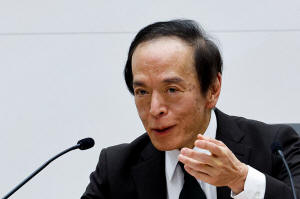Bank of Japan may be less dovish than markets think
 Send a link to a friend
Send a link to a friend
 [March 26, 2024] By
Leika Kihara [March 26, 2024] By
Leika Kihara
TOKYO (Reuters) - The Bank of Japan has ditched its dovish forward
guidance in favor of a more "data-dependent" approach to policy
deliberations after ending negative rates, sources say, keeping the door
open for another near-term hike in borrowing costs.
The BOJ ended eight years of negative rates and unorthodox policy last
week, making a historic shift away from decades of massive monetary
stimulus.
Despite the rate hike, the yen has tumbled more than 1% since the policy
pivot, as markets' dovish reading of the BOJ's communication reinforced
expectations that another rate hike would be some time off.
In its decision last week, the BOJ said it "anticipates that
accommodative financial conditions will be maintained for the time
being".
However, a close look at the BOJ statement shows the bank has made no
promise to keep interest rates at current low levels but instead
conditionally states that borrowing costs could stay low if economic and
price conditions don't change.
"The BOJ has made no commitment about the future rate hike pace," a
source familiar with the bank's thinking said on the March statement, a
view echoed by another source.
"The timing of the next move is data-dependent, which means all options
are on the table," the first source said.

The BOJ's language last week compared with the more assertive tone of
previous guidance that it "will continue" with ultra-loose policy to
stably hit its price target, and "will not hesitate" to ramp up stimulus
if needed.
The new approach to communication aligns the BOJ with other major
central banks, including the Federal Reserve, which ditched rigid
forward guidance in favor of a more discretionary approach as they hiked
rates aggressively to combat soaring inflation.
While refraining from specifying a timing, BOJ Governor Kazuo Ueda said
last week the bank could raise rates if trend inflation, which is still
below 2%, heightens "a bit more."
"If our price forecast clearly overshoots or, even if our median
forecast is unchanged, we see a clear increase in upside risk to the
price outlook, that will likely lead to a policy change," Ueda said.
[to top of second column] |

Bank of Japan Governor Kazuo Ueda gestures as he speaks during a
press conference after a policy meeting at BOJ headquarters, in
Tokyo, Japan March 19, 2024. REUTERS/Kim Kyung-Hoon/File Photo

The remarks heighten the importance of the BOJ's fresh quarterly
growth and inflation forecasts due at its next policy meeting on
April 25-26, which for the first time will include projections for
fiscal 2026.
While the BOJ likely won't hike rates next month, the new forecasts
will offer clues on how optimistic policymakers are about the chance
of trend inflation heightening to 2%.
A Reuters poll taken after the March policy shift showed more than a
half of economists expect the BOJ to hike rates again this year,
though most do not see rate hikes coming at least until the fourth
quarter.
Some analysts see the weak yen as a potential trigger for further
rate hikes, as the currency's renewed declines could push up raw
material import costs again.
Ueda has said the BOJ "stood ready to respond" if yen moves had a
huge impact on its economic and price projections.
"The BOJ seems wary of the risk of one-sided yen declines," which
could prompt further rate hikes without much pause, said Shunsuke
Kobayashi, chief economist at Mizuho Securities.
"There's a significant chance of the BOJ hiking rates again from
October-December onward," he said.
Others even see the chance of action at the BOJ's meeting on July
25-26, when more data becomes available on whether bumper wages
hikes are spreading to smaller firms.
"If there's a chance of an overshoot in inflation, the BOJ could act
as soon as in July," said Mari Iwashita, a veteran BOJ watcher who
is chief market economist at Daiwa Securities.
(Reporting by Leika Kihara. Editing by Sam Holmes.)
[© 2024 Thomson Reuters. All rights
reserved.]
This material may not be published,
broadcast, rewritten or redistributed.
Thompson Reuters is solely responsible for this content.
 |